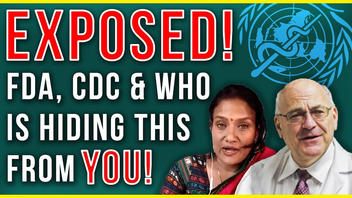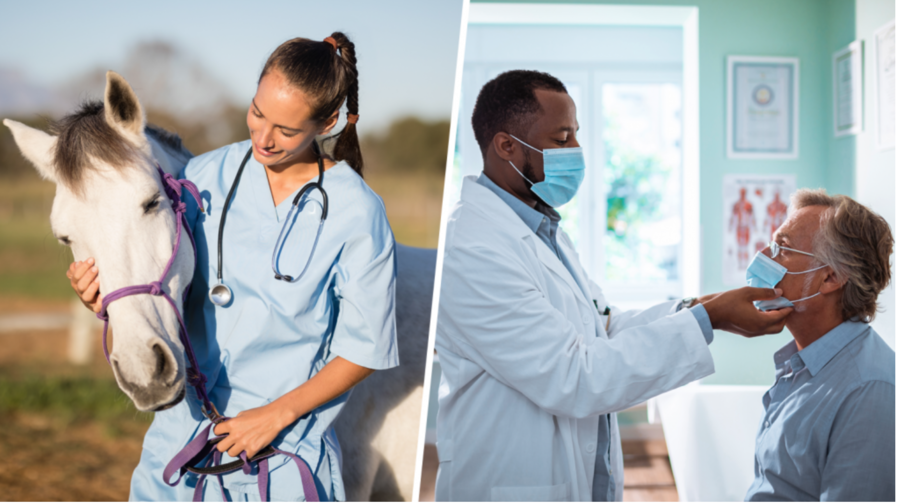
Is this video correct in saying ivermectin is a successful treatment for COVID-19, and that is being covered up by the media and the FDA, CDC and WHO; and is natural immunity through infection better than a COVID-19 vaccine? No, none of those claims are true: There is no proof offered in a video about the three organizations "hiding" information regarding the effectiveness of ivermectin in the treatment of COVID-19, nor that natural immunity is better than a COVID-19 vaccine.
Lead Stories has debunked these claims multiple times. Government agencies and the pharmaceutical company that makes ivermectin have all advised people not to take ivermectin to treat COVID-19. While natural immunity provides some degree of protection against COVID-19 infection, medical professionals counsel people that a vaccine greatly reduces the risk of serious illness or death from the disease, risks that have to be taken in order to gain natural immunity. Meanwhile, a UCLA researcher's latest study shows natural immunity is highly variable, vaccination yields strong immunity and the combination of both yields the strongest immunity, though infection comes with risks.
The claim appeared in a video (archived here) where it was published on YouTube on September 6, 2021, under the title "EXPOSED! FDA, CDC & WHO is hiding this from you? | Dr Paul Marik FLCCC - Vijaya Viswanathan". It opened:
Is the world getting the best science-based solutions for COVID 19 or are there vested interests with deep pockets controlling the discourse?
Click below to watch the video on YouTube:
There is no evidence offered that the Food and Drug Administration (FDA), the Centers for Disease Control (CDC) and the World Health Organization (WHO) are perpetrating a mass cover-up of effective treatments for COVID-19 or the fact that natural immunity is better than a COVID-19 vaccine. Both topics are widely discussed on social media and in mainstream media, which makes the secrecy claim illogical.
The 44-minute video is hosted by Vijaya Viswanathan from the Infinity Foundation, established to push back against non-Indian scholarship about India. Her guest, Dr. Paul Marik, is a professor of medicine who belongs to FLCCC (Front Line COVID-19 Critical Care Alliance) an anti-vaccine group that has been cited for perpetuating unsubstantiated claims regarding COVID-19 in a scholarly article in Frontiers in Pharmacology.
Marik makes a false claim about ivermectin at 6:59 in the video:
Now, the current lie perpetuated by the FDA is that this is a dangerous drug made for animals only.
That is not what the Food and Drug Administration (FDA) has said. Lead Stories has debunked similar claims about ivermectin here, noting that FDA and mass media reports point out it is both a veterinary and human drug and that it is highly effective against river blindness and other parasite-caused disorders. In a related fact check, Lead Stories found no evidence that ivermectin was being described only as a horse treatment.
Ivermectin is widely used as a dewormer for horses and, in much smaller doses, to treat rosacea and some parasites in humans. The Food & Drug Administration counsels doctors not to use it for prevention or treatment of COVID-19 and warns patients not to buy farm-store forms of the medicine for their own use.
The FDA's warnings about ivermectin emphasize its use for horses:
On the webpage featuring a horse and titled Why You Should Not Use Ivermectin to Treat or Prevent COVID-19, the FDA said:
The FDA has received multiple reports of patients who have required medical support and been hospitalized after self-medicating with ivermectin intended for horses ...There's a lot of misinformation around, and you may have heard that it's okay to take large doses of ivermectin. That is wrong. Even the levels of ivermectin for approved uses can interact with other medications, like blood-thinners. You can also overdose on ivermectin, which can cause nausea, vomiting, diarrhea, hypotension (low blood pressure), allergic reactions (itching and hives), dizziness, ataxia (problems with balance), seizures, coma and even death.
Merck, which makes the drug, is unequivocal in discouraging its use against COVID-19, though the company would likely profit if the drug were approved for treatment of the virus that has killed millions worldwide. In an August 23, 2021, email to Lead Stories, a Merck spokesperson wrote:
As our company has already indicated company scientists are carefully examining the findings of available and emerging studies of ivermectin for the treatment of COVID-19 for evidence of efficacy and safety and continue to engage with the external scientific community regarding ongoing research. It is important to note that based on our review of available data, our analysis has identified:
- No scientific basis for a potential therapeutic effect against COVID-19 from pre-clinical studies;
- Significant limitations in evidence for clinical activity or clinical efficacy in patients with COVID-19 disease, rendering existing data inconclusive, and;
- A lack of safety data in the majority of studies.
Dr. Otto Yang, a UCLA researcher whose specialty is infectious disease, explained over the phone to Lead Stories on September 15, 2021, that ivermectin is not an effective treatment of COVID-19:
It [ivermectin] does stop the virus in the test tube, but the problem is that the amount that you need is ten thousand times what you can achieve in a person. So, it's basically working the same way bleach would. Bleach kills the virus, but the amount that you need to kill the virus is not safe in a person and that's the same with ivermectin. Just because something kills the virus doesn't mean you can use it safely.
At 30:48 in the video Marik makes the claim that natural immunity is more effective against COVID-19 than the vaccine:
We do know there's recent data showing that if you've had a natural infection and natural immunity your protection against COVID is much better than if you get the vaccine.
Lead Stories has debunked this claim multiple times and readers can find those fact checks here.
Published data show that contracting COVID-19 when unvaccinated can be deadly while getting a vaccine can greatly reduce or prevent serious illness or death of patients who contract COVID-19 after having been vaccinated.
Dr. Yang explained he released a research report titled, "Primary, Recall, and Decay Kinetics of SARS-CoV‐2 Vaccine Antibody Responses" that he says settles the question of vaccination vs. infection as the best mechanism to build immunity.
Yang and his colleagues studied the antibody levels of three groups: people who had the vaccine without prior COVID, people with prior COVID-19 that didn't get vaccinated and people who had prior COVID plus the vaccine. The people who had COVID plus the vaccine got the vaccine after they were infected with the virus and did not have breakthrough COVID cases:
We looked at the antibody levels in those groups and what we saw was that the people who had COVID had very highly variable levels of antibodies ranging over a very large interval and the amount of antibodies they had depended on how severe their infection was. So, someone who has a really severe infection can have antibody levels that are a thousand times higher than somebody who had a mild case of COVID and wasn't hospitalized. And what we found was that after vaccination people have antibody levels that are higher than people who had mild COVID by a lot and get close to the levels, not quite as high, but almost as high as people who had severe COVID.
Then we find that someone who had COVID and then gets vaccinated has the highest antibody levels. Higher than severe COVID-19 and higher than vaccine alone. It didn't matter how mild or severe their COVID was, after they get vaccinated they reach a very high level regardless of what their previous antibody level was. The combination of COVID plus vaccination brings people to this a ceiling of the highest they could get.
Yang explained that natural immunity is dependent upon the individual's level of infection:
The question of whether natural immunity is stronger or better than the vaccine immunity from the standpoint of antibodies is that it depends on how severe the person's infection was. If a person had a very mild infection, then the antibody levels are going to be much less than you would achieve with vaccination. If a person had very, very severe COVID requiring hospitalization then they have antibody levels that are similar to what you get with vaccination, maybe a little bit higher than what you get with vaccination.
And if somebody even had very mild COVID and barely had any antibodies after their COVID and they get vaccinated they have a huge amount of antibodies. That's very high.
He continued, saying that the vaccine provides the most protection from severe illness or death and that people ignore the role of T-cells when focusing on antibodies:
Actually T-cells are as important, if not more important and that's reflected by the fact that with the delta variant escaping antibodies and antibodies declining over time breakthrough infections are becoming very common after vaccinations.
But protection from severe illness and death is still extremely good with the vaccines. So if you look at the data in Israel, where they put us to shame in terms of keeping better track of what's going on, what you see is that people that have been vaccinated five months ago, the vaccine is only 16% effective in preventing an infection. But it's still well over 90% in terms of preventing someone from getting sick enough and needing to go to the hospital.


















